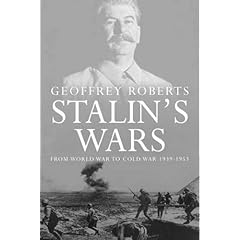Why Roosevelt Was Right About Stalin
by Geoffrey Roberts
Mr. Roberts is a Professor in the Department of History at the University College Cork, Ireland.

Roosevelt was right about Stalin. The Soviet dictator was a man you could do business with. That is one of the main findings of my new book, Stalin’s Wars: From World War to Cold War, 1939-1953 (Yale University Press 2007). “Had I been born and brought up in America,” Stalin told the head of the American Chamber of Commerce in June 1944, I would probably have been a businessman.” Even as the Cold War broke out Stalin tried to persuade the Republican politician Harold Stassen of the merits of Soviet-American collaboration. “I am not a propagandist, I am a man of business,” Stalin told his visitor in April 1947, pointing out that he and Roosevelt had never indulged in the name-calling game of “totalitarians” v. “monopoly capitalists.”

Among the many myths of the Cold War none has been more persistent than the idea that it was Roosevelt’s appeasement of Stalin during World War II that encouraged Soviet aggression and expansionism, resulting in the loss of Eastern Europe to communist control. This criticism was most often voiced at the height of tensions in the late 1940s and early 1950s but resurfaced later on every occasion the periodic détentes in East-West relations faltered and international anxieties increased. In the post-Cold War years conservative commentators renewed the attack on how Roosevelt conducted relations with Stalin, using the story as a cautionary tale about the dangers of appeasing dictators. One of the most oft-cited historical justifications for the war in Iraq has been that the experience of appeasing Stalin in the 1940s -- and Hitler in the 1930s -- demonstrates that the sooner dictators like Saddam Hussein are stopped the better.

